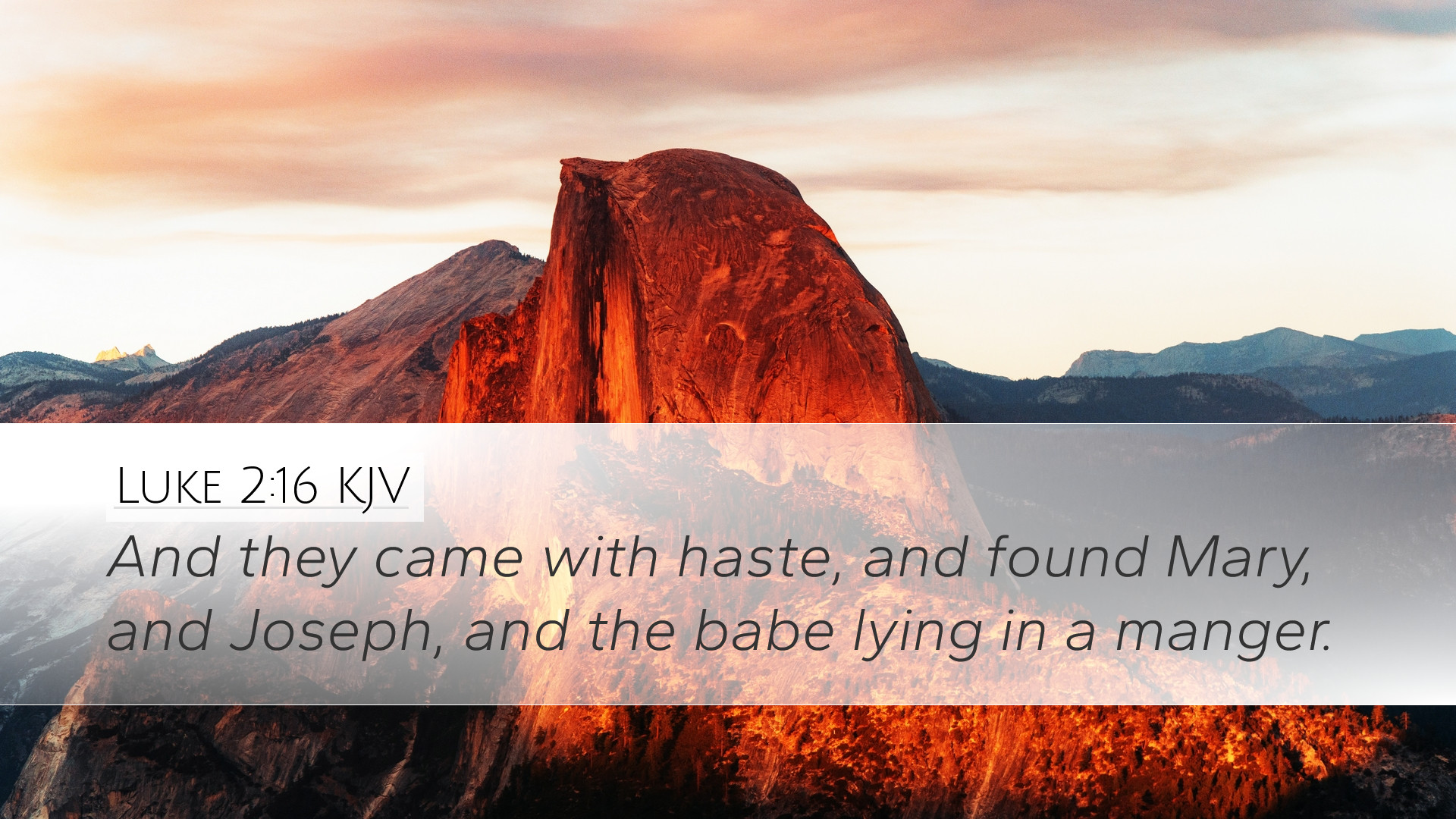Commentary on Luke 2:16
Luke 2:16 states: "And they came with haste, and found Mary, and Joseph, and the babe lying in a manger." This verse encapsulates a moment of great significance in the narrative of the Nativity, emphasizing the urgency and faith of the shepherds as they respond to the angelic message regarding the birth of Jesus.
Introduction
This verse marks a pivotal point in the Gospel of Luke, illustrating the fulfillment of prophetic declarations and God's unfolding plan of salvation. The coming of the shepherds provides unique insights into the character and implications of Jesus’s birth, which this commentary aims to elucidate.
Context and Background
To fully appreciate the weight of Luke 2:16, one must consider the surrounding narrative. The angel’s announcement to the shepherds is preceded by an immense joy and a profound display of divine revelation. As Matthew Henry notes, “The good tidings of great joy are not for the great men of the earth, but for the humble and lowly.” This highlights the theme of God choosing the lowly and marginalized to receive the news of the Savior’s birth.
Analysis of Key Phrases
"They came with haste"
Here, we see the shepherds’ immediate response to the news of Christ’s birth. Albert Barnes observes that this urgency reflects their faith, as they believed the angel’s message without hesitation. This promptness invites readers to consider their own responses to God’s invitations.
"Found Mary, and Joseph, and the babe lying in a manger"
In their search, the shepherds discovered the holy family. Adam Clarke points out the significance of finding Jesus in a humble setting—“a manger”—which signifies the incarnation of God in humility. This motif of divine humility is central throughout Luke’s Gospel and invites us to recognize God’s presence in unexpected circumstances.
Theological Implications
This verse not only narrates a historical event but also encapsulates vital theological truths:
- The Accessibility of Christ: The shepherds, considered outcasts and lowly, were the first to receive the news of Christ's birth. This reflects the inclusive nature of the Gospel, wherein Jesus comes to the needy (Henry).
- The Fulfillment of Prophecy: The shepherds’ encounter symbolizes the fulfillment of Old Testament prophecies concerning the Messiah’s humility (Barnes). Jesus being born in a manger is a radical reminder of His purpose and mission among the downtrodden.
- The Nature of True Worship: The shepherds came to worship Jesus. Such a theme resonates with the understanding of worship, not in grandeur but in humility, seeking the heart of God in the most simple of settings (Clarke).
Application for Pastors and Theologians
This passage offers substantive material for pastoral teachings, emphasizing the need for urgency in responding to God’s calling. Pastors can draw lessons on the nature of faith that compels immediate action and the humility that should characterize their ministry. Moreover, it serves as a powerful reminder to academic pursuits; the qualities of faith and humility are key attitudes in theological reflection.
Lessons from the Shepherds
- Faith leads to action: In the example of the shepherds, we see that genuine faith manifests in proactive steps to follow God’s leading.
- God’s reach to all: The account encourages a broad understanding of ministry that transcends societal boundaries.
- The significance of humble places: The shepherds’ visitation reminds us that God often operates in and through humble circumstances, inviting us to seek Him in all areas of life.
Conclusion
Luke 2:16 captures a moment ripe with significance about the nature of Christ's entrance into the world and the response it elicits. By reflecting on the shepherds’ hurried visit to see the newborn King, we are encouraged to act with haste in our own responses to God’s persistent invitations. This narrative invites us to deepen our understanding of humility, faith, and the all-encompassing love of God through Jesus Christ.
As believers seek to embody the principles illustrated in this passage, it serves as a reminder that Christmas and the message of the Gospel are indeed for everyone, inviting all to discover the wonder of Christ.


